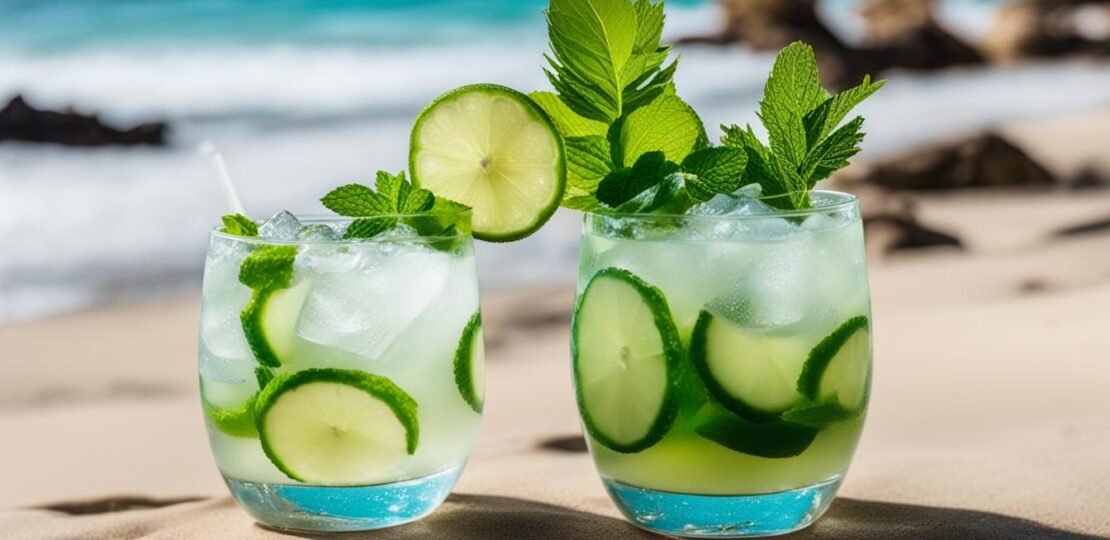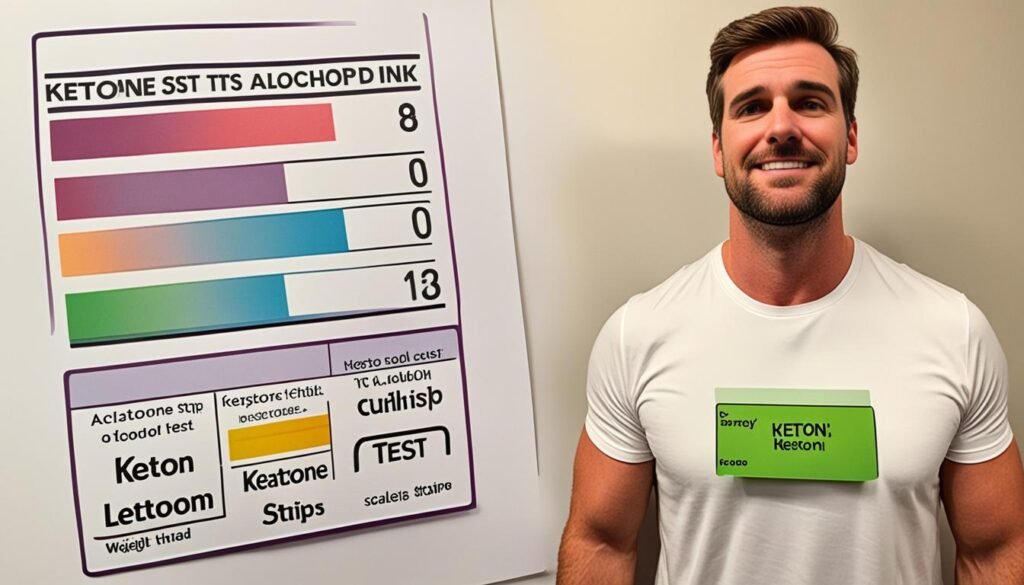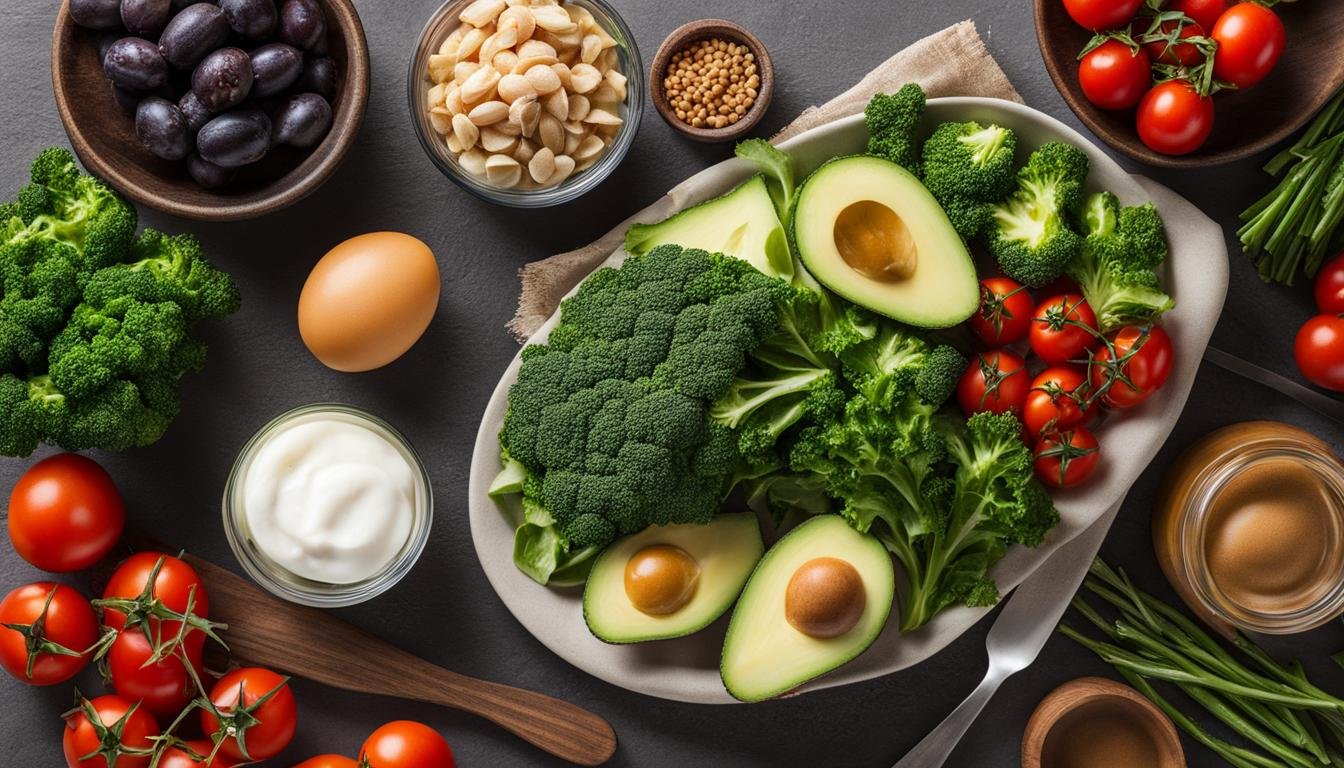Keto and Alcohol: Making Smart Choices While Maintaining Ketosis
February 8, 2024 | by ketooclock.com

Can you still enjoy a drink while following a ketogenic diet? Are alcohol and ketosis compatible? These are common questions for those who have embarked on a keto journey. Let’s uncover the truth behind alcohol consumption on a ketogenic diet and explore how it can impact your weight loss goals.
Key Takeaways:
- Alcohol consumption can affect ketosis and weight loss on a ketogenic diet.
- Factors such as the alcohol content, type, and quantity can influence the impact of alcohol on ketosis.
- Alcohol metabolism prioritizes the breakdown of alcohol over the breakdown of stored fat for energy.
- Practicing moderation, portion control, and making smart alcohol choices can help maintain ketosis on a ketogenic diet.
- Some low-carb alcoholic options, such as pure spirits, dry wine, and extra dry champagne, can be enjoyed in moderation on keto.
Understanding Ketosis and the Ketogenic Diet
Ketosis is a metabolic state where the body burns stored fat for fuel instead of carbohydrates. This process occurs when carbohydrate intake is restricted, and healthy fat consumption is increased, as in the ketogenic diet.
The ketogenic diet is a low-carb, high-fat diet that helps the body enter and maintain ketosis. By limiting carbohydrates, the body is forced to utilize fat as its primary energy source, leading to weight loss.
However, it’s important to note that individual factors can affect the effectiveness of the ketogenic diet for weight loss. These factors include metabolism, activity levels, and adherence to the diet.
During ketosis, the body produces ketones, which are byproducts of fat metabolism. These ketones serve as an alternative fuel source, providing energy to the body and brain.
The ketogenic diet typically includes foods rich in healthy fats, such as avocados, nuts, and olive oil, along with moderate protein intake from sources like meat, fish, and eggs. Carbohydrate intake is kept to a minimum, primarily from non-starchy vegetables.
To maintain ketosis and optimize weight loss, it’s crucial to carefully monitor carbohydrate intake and prioritize healthy fats. This metabolic state offers numerous benefits beyond weight loss, including improved mental clarity, increased energy levels, and reduced inflammation.
In the next section, we will explore the impact of alcohol on ketosis and how it can potentially hinder weight loss progress on the ketogenic diet.
The Impact of Alcohol on Ketosis
Alcohol consumption can have a significant impact on ketosis, the metabolic state essential for a ketogenic diet. By understanding how alcohol affects ketosis, individuals on a ketogenic diet can make informed choices to maintain their progress.
Effect 1: Carbohydrate Content
Many alcoholic beverages contain carbohydrates, which can hinder ketosis by temporarily raising blood sugar levels. These carbohydrates can come from various sources, including sugars and other additives found in mixed drinks or flavored spirits. While the carb content may be higher in some drinks than others, it’s important to be mindful of the overall carb intake to stay in ketosis.
Effect 2: Fat Metabolism
Alcohol metabolism takes priority over the breakdown of stored fat for energy, potentially slowing down the progress of ketosis. When alcohol enters the body, it is quickly metabolized and utilized as a fuel source, diverting the focus away from burning fat. This can impede weight loss efforts and prolong the time it takes for the body to enter or reenter ketosis.
“The ketogenic diet aims to shift the body’s metabolism to rely on fat for fuel. Alcohol consumption can disrupt this process by interfering with fat metabolism.”
To illustrate the impact of alcohol on ketosis, consider the table below:
| Alcoholic Beverage | Carbohydrate Content (per serving) |
|---|---|
| Dry White Wine | 2 grams |
| Vodka (1.5 oz) | 0 grams |
| Regular Beer (12 fl oz) | 13 grams |

As seen in the table, certain alcoholic beverages, like dry white wine and vodka, have a lower carbohydrate content compared to regular beer. Choosing low-carb options can minimize the impact on ketosis and help individuals stay on track with their ketogenic diet.
By understanding the impact of alcohol on ketosis, individuals can make conscious decisions about consuming alcohol while on a ketogenic diet. Consideration of both carbohydrate content and the potential effect on fat metabolism is crucial for maintaining ketosis and achieving weight loss goals.
Factors to Consider
When it comes to alcohol consumption on a ketogenic diet, several factors can influence its impact on ketosis. It’s important to consider these factors to make informed decisions and maintain your progress on the keto journey.
- Alcohol Content: The alcohol content of different beverages can vary significantly. It’s essential to be aware of the alcohol content as higher alcohol concentration may have a more significant impact on ketosis.
- Type of Beverage: Various types of alcoholic beverages contain different ingredients and macronutrient profiles. Some drinks may have higher carbohydrate content, which can temporarily raise blood sugar levels and potentially hinder ketosis. Opting for low-carb options such as pure spirits or dry wine can be a better choice.
- Quantity of Alcohol: The quantity of alcohol consumed plays a crucial role in its impact on ketosis. Consuming too much alcohol can lead to excessive caloric intake, which may hinder weight loss progress. Moderation is key when incorporating alcohol into a ketogenic lifestyle.
- Individual Metabolic Variability: Every individual’s metabolic response to alcohol can vary. Some people metabolize alcohol more efficiently than others, while some may experience a slower breakdown process. It’s important to listen to your body and understand how alcohol affects your unique metabolic rate.
By considering the alcohol content, type of beverage, quantity, and individual metabolic variability, you can make informed choices that align with your goals on the ketogenic diet.
Emphasize key points:
It’s important to consider the alcohol content, type of beverage, quantity of alcohol, and individual metabolic variability when consuming alcohol on a ketogenic diet. Making informed decisions based on these factors can help you maintain ketosis and continue your weight loss journey successfully.
Effects of Alcohol on the Ketogenic Diet
Alcohol consumption on the ketogenic diet can have various effects on the body, including potentially interrupting ketosis, increasing caloric intake, and impairing decision making. When alcohol is consumed, the body prioritizes its metabolism, diverting attention away from the breakdown of stored fat, which is crucial for weight loss on a ketogenic diet. This can slow down progress and hinder your goals.
It’s important to be aware of these effects and make conscious choices when it comes to drinking alcohol on keto. Understanding the impact of alcohol on ketosis and weight loss is key to maintaining a successful ketogenic lifestyle. By being mindful of the potential consequences, you can make informed decisions and take steps to mitigate any negative effects.
Interrupting ketosis is a concern for many individuals following a ketogenic diet. Since alcohol is processed by the body as a priority, it can hinder the breakdown of stored fat and the production of ketones. This interruption in ketosis may delay progress and make it more challenging to achieve weight loss goals.
In addition to interrupting ketosis, consuming alcohol can also lead to an increased caloric intake. Many alcoholic beverages contain a significant number of calories, which can add up quickly. This higher caloric intake can impede weight loss efforts and make it more difficult to maintain a calorie deficit, a key aspect of losing weight on a ketogenic diet.
Furthermore, alcohol consumption can impair decision making, which can have a ripple effect on your overall dietary choices. Impaired decision making may lead to indulging in unhealthy foods or making poor choices that deviate from the principles of a ketogenic diet. It’s essential to be mindful of these potential consequences and prioritize making informed choices.
Ultimately, balancing alcohol consumption with a ketogenic diet requires careful consideration and conscious decision making. It’s important to understand the effects of alcohol on ketosis, be aware of increased caloric intake, and stay mindful of impaired decision making. By understanding these effects, you can make informed choices and find a balance that aligns with your goals on the ketogenic diet.
| Effects of Alcohol on the Ketogenic Diet |
|---|
| Interrupted Ketosis |
| Increased Caloric Intake |
| Impaired Decision Making |
Strategies for Managing Alcohol on a Ketogenic Diet
Managing alcohol consumption on a ketogenic diet can be challenging but not impossible. By implementing effective strategies, you can enjoy alcohol while maintaining ketosis. Here are some tips to help you make smart choices:
- Practice Moderation: Moderation is key when it comes to alcohol on a ketogenic diet. Excessive alcohol consumption can hinder ketosis and lead to weight gain. Limit your alcohol intake to avoid any negative impacts on your progress.
- Portion Control: Be mindful of portion sizes when consuming alcoholic beverages. Stick to a single serving and avoid overindulging. Moderating portion sizes will help you manage your alcohol intake and stay on track with your ketogenic goals.
- Choose Smart Alcohol Options: Opt for low-carb alcohol choices to minimize the impact on ketosis. Pure spirits like vodka, gin, and whiskey are generally zero-carb and can be consumed in moderation on a ketogenic diet. Additionally, dry wines and extra dry champagne have low carbohydrate content and can be enjoyed in limited quantities.
- Be Alcohol Content Conscious: Pay attention to the alcohol content of the beverages you consume. Higher alcohol content can potentially affect ketosis more than lower alcohol content options. Consider lighter drinks or dilute stronger beverages to lower their overall alcohol content.
By prioritizing moderation, portion control, and making smart alcohol choices, you can effectively manage alcohol consumption while maintaining ketosis on a ketogenic diet.

Note: Always consult with a healthcare professional or nutritionist before making significant changes to your diet or alcohol consumption.
Can You Have Alcohol on Keto?
While alcohol is generally not recommended on the keto diet, there are low-carb alcoholic drinks that may be compatible with ketosis for individuals who tolerate alcohol well. It’s important to make informed choices about alcohol consumption on keto, taking into consideration individual metabolic response and ketone production.
Alcohol can affect ketosis in different ways depending on individual factors. For some people, alcohol may temporarily disrupt ketosis by raising blood sugar levels due to the carbohydrates present in certain alcoholic beverages. Additionally, alcohol metabolism favors the breakdown of alcohol over the breakdown of stored fat for energy, potentially slowing down the progress of ketosis.
Listening to your body and understanding how alcohol impacts your ketosis is crucial. Some individuals may experience minimal effects on ketosis even with occasional alcohol consumption, while others may find it more challenging to maintain ketosis while consuming alcohol.
It’s important to choose low-carb alcoholic drinks when enjoying alcohol on keto. Opting for pure spirits like vodka, gin, and whiskey, which are generally carb-free, can minimize the impact on ketosis. Dry wine and extra dry champagne are also options with lower carbohydrate content. However, it’s crucial to moderate alcohol consumption and be aware of the alcohol content and your own metabolic response.
Keep in mind that alcohol can have different effects on metabolism and weight loss goals. While alcohol is being metabolized, fat burning may be temporarily interrupted, potentially leading to fat storage. To optimize your progress on a ketogenic diet, it’s essential to strike a balance between enjoying alcohol in moderation and maintaining your ketosis and weight loss goals.
Keto-Friendly Alcohol Options
When following a ketogenic diet, it’s important to choose alcohol options that are low in carbs and won’t disrupt your state of ketosis. Here are some keto-friendly alcohol choices to consider:
Pure Spirits
Pure spirits such as vodka, gin, and whiskey are excellent choices for those on a keto diet. These spirits are typically zero-carb, making them a safe bet for maintaining ketosis. Just remember to enjoy them in moderation and avoid mixers that are high in sugar.
Dry Wine
Dry wines, such as Sauvignon Blanc, Pinot Grigio, and Chardonnay, are lower in carbohydrates compared to sweeter wine varieties. They can be enjoyed in moderation on a ketogenic diet. Keep in mind that each glass of wine contains about 4-5 grams of carbs, so be mindful of your intake.
Extra Dry Champagne
For special occasions, you can opt for extra dry champagne. Champagne with “extra brut” or “brut nature” labeling is typically lower in sugar and carbohydrates compared to sweeter varieties. Just like with wine, moderation is key when enjoying champagne on a keto diet.
It’s important to note that while these options are relatively low in carbs, they still contain alcohol, which should be consumed in moderation. Additionally, it’s best to avoid high-carb drinks like beer and sweet cocktails, as they can significantly impact your ketosis and hinder your weight loss goals.
Now that you have a better idea of keto-friendly alcohol options, you can make smart choices while indulging in a drink or two. Remember, moderation is key, and always listen to your body’s response to alcohol while on a ketogenic diet.
Effects of Alcohol on Metabolism
When it comes to the impact of alcohol on metabolism, it’s important to understand how it can affect the body’s ability to burn fat and store energy. Alcohol metabolism prioritizes the breakdown of alcohol byproducts, which can interfere with the burning of stored fat for energy. This means that when alcohol is present in the system, the body may store more fat instead of efficiently using it for fuel.
The metabolism of alcohol produces byproducts that require immediate attention from the body. As a result, the breakdown of stored fat, which is essential for weight loss, is often put on hold. The excess calories from alcohol are more likely to be stored as fat, adding to existing fat stores and potentially impeding progress in burning fat.
“Alcohol metabolism can slow down the fat-burning process on a ketogenic diet, potentially leading to fat storage.”
For individuals following a ketogenic diet, where the primary goal is to burn fat for fuel, these effects can be particularly concerning. The body’s ability to enter and maintain ketosis, the metabolic state where fat is the primary source of fuel, may be disrupted by alcohol consumption. This interruption of ketosis can hinder weight loss and make it more challenging to reach desired fat loss goals.
It’s crucial to be mindful of the impact of alcohol on metabolism and weight loss goals while following a ketogenic diet. Making informed choices about when and how much alcohol to consume, as well as incorporating strategies for moderation, can help minimize the effects on fat metabolism.
Effects of Alcohol on Metabolism
| Effects of Alcohol on Metabolism |
|---|
| Prioritizes the breakdown of alcohol byproducts over stored fat |
| May lead to fat storage instead of burning fat for fuel |
| Can interfere with the progress of ketosis on a ketogenic diet |
Considerations for Alcohol Consumption on Keto
When following a ketogenic diet, it’s important to consider the effects of alcohol consumption. Alcohol can have a significant impact on your body’s response to alcohol and interfere with decision making. Let’s explore the key considerations when it comes to alcohol and the keto diet.
Lowered Alcohol Tolerance
One of the notable effects of alcohol on keto is lowered alcohol tolerance. Due to the reduced carbohydrate intake on a ketogenic diet, your body becomes more sensitive to the effects of alcohol. This means that you may feel the effects of alcohol more quickly and intensely compared to when you were not in ketosis. It’s essential to be mindful of this change in tolerance and pace your alcohol consumption accordingly to avoid overconsumption.
Interference with Decision Making
Alcohol can also interfere with decision making, which is crucial to maintaining a healthy and successful keto diet. When under the influence of alcohol, it can be more challenging to resist temptations and make informed choices about your food and drink options. This can potentially lead to deviations from your keto plan, jeopardizing your progress. Being aware of this interference and practicing self-control can help you stay on track with your dietary goals.
In conclusion, alcohol consumption on the keto diet requires careful consideration. Lowered alcohol tolerance and interference with decision making are two crucial factors to keep in mind. By being aware of these effects and making responsible choices, you can enjoy alcohol in moderation while still maintaining ketosis and progressing towards your health and weight loss goals.
Conclusion
When following a ketogenic diet, finding a balance between alcohol consumption and maintaining ketosis is essential. By making informed choices and understanding the impact of alcohol on ketosis, individuals can enjoy a drink or two while staying on track with their goals.
It’s important to consider individual factors such as alcohol tolerance and metabolic response when deciding whether to include alcohol in a ketogenic diet. Practicing moderation and portion control is crucial to avoid hindering ketosis and weight loss progress.
For those who choose to indulge, opting for keto-friendly alcohol options such as pure spirits, dry wine, or extra dry champagne can help minimize the carbohydrate content. Avoiding high-carb drinks, like beer and sweet cocktails, is advisable.
Ultimately, maintaining a balance between alcohol and a ketogenic diet requires informed choices and mindfulness. By being aware of the impact of alcohol on ketosis and following strategies for moderation, individuals can enjoy social occasions without jeopardizing their progress on the ketogenic journey.
FAQ
Can I consume alcohol while on a ketogenic diet?
Yes, but it’s important to make smart choices and understand the impact it can have on ketosis and weight loss.
What is ketosis?
Ketosis is a metabolic state where the body burns stored fat for fuel instead of carbohydrates.
How does alcohol affect ketosis?
Alcohol can potentially interrupt ketosis and slow down the process of burning stored fat for energy.
What factors should I consider when consuming alcohol on a ketogenic diet?
Factors to consider include the alcohol content and type of beverage, the quantity of alcohol consumed, and individual metabolic variability.
How does alcohol impact the ketogenic diet?
Alcohol can potentially interrupt ketosis, increase caloric intake, and impair decision making on the ketogenic diet.
How can I manage alcohol consumption on a ketogenic diet?
Practicing moderation, portion control, and making smart alcohol choices can help maintain ketosis while enjoying alcohol.
Can I have alcohol on a ketogenic diet?
Some low-carb alcoholic drinks may be compatible with ketosis, but individual metabolic response and ketone production may vary.
What are some keto-friendly alcohol options?
Pure spirits like vodka, gin, and whiskey, as well as dry wine and extra dry champagne, are generally low in carbohydrates and suitable for a ketogenic diet.
How does alcohol affect metabolism?
Alcohol metabolism prioritizes the breakdown of alcohol byproducts over the burning of stored fat, potentially leading to fat storage and slowing down the fat-burning process.
What considerations should I keep in mind when consuming alcohol on keto?
Alcohol on the keto diet can lower alcohol tolerance and interfere with decision making, so it’s important to be mindful of its impact on the body.
RELATED POSTS
View all



